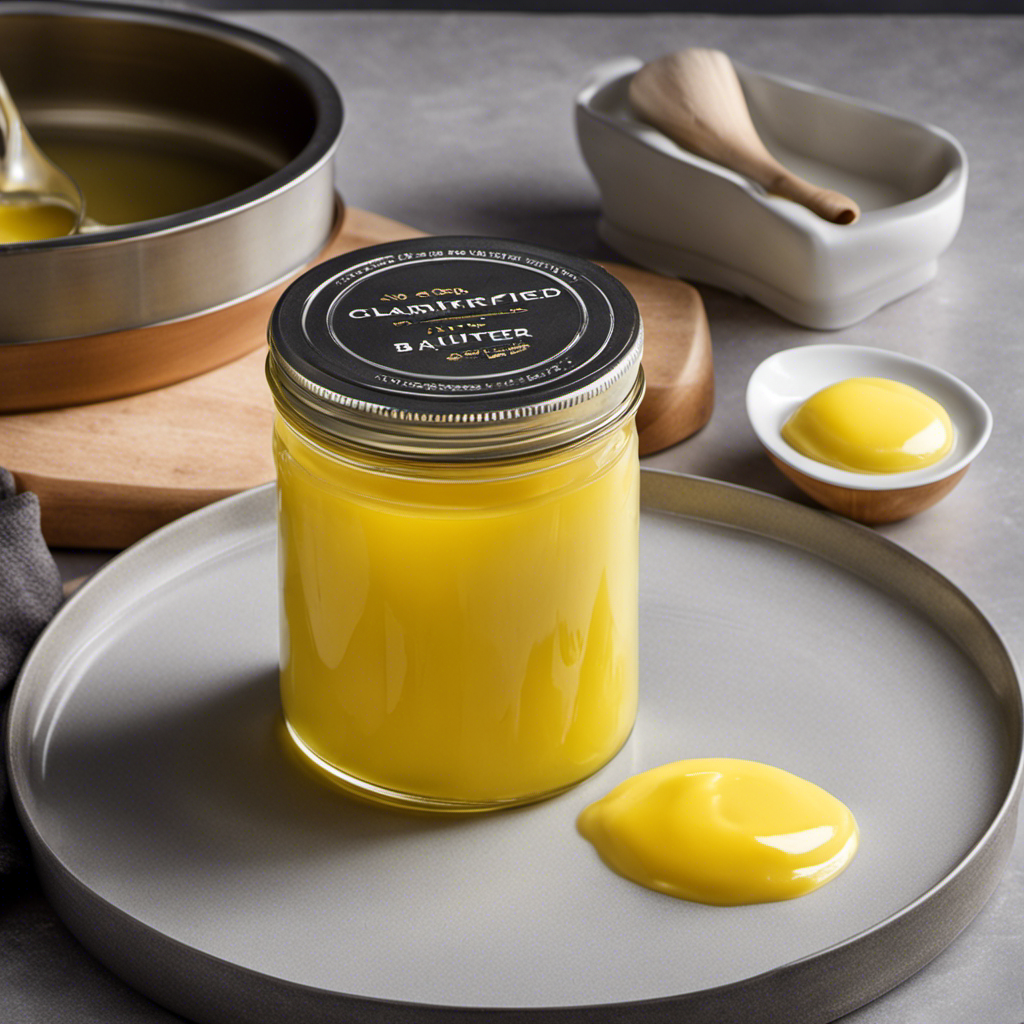To keep your butter fresh in the summer heat, store it at room temperature between 65°F and 70°F for up to a week. Use an airtight container like a glass jar or ceramic crock to lock in flavor and prevent odor absorption. For longer storage, divide butter into smaller portions, wrap them tightly, and freeze in airtight bags or containers. Always label with dates to track freshness. Watch for signs of spoilage like sour smells or discoloration. With these simple solutions, you can enjoy spreadable, delicious butter all summer long—plus, there's more to explore if you want to enhance your butter storage techniques!
Key Takeaways
- Store butter at optimal temperatures of 65°F to 70°F to prevent greasiness and melting during summer heat.
- Use airtight containers to preserve flavor and prevent absorption of odors, ideally glass or ceramic.
- For immediate use, keep butter at room temperature for up to a week; refrigerate for longer freshness.
- Divide butter into smaller portions and wrap tightly for long-term storage, minimizing air exposure.
- Regularly check for signs of spoilage, such as sour smells or discoloration, to ensure butter remains fresh.
Best Temperature for Butter

When it comes to storing butter, the ideal temperature is crucial for maintaining its freshness and flavor. Butter should be kept at a cool room temperature, ideally between 65°F and 70°F (18°C to 21°C). This range allows the butter to remain soft enough for easy spreading while preventing it from melting or becoming overly greasy.
If your kitchen tends to get warm, consider placing your butter in a cooler spot, like a pantry or a shaded area away from direct sunlight. If temperatures exceed 70°F, you risk the butter turning rancid more quickly, which could ruin its taste.
In hot summer months, you might even need to refrigerate your butter to keep it fresh. However, refrigerating butter can make it hard and less spreadable, so take out the amount you need and let it sit for a few minutes before using.
To guarantee your butter maintains its quality over time, try to buy smaller quantities more frequently rather than stockpiling large amounts. This way, you can enjoy fresh butter without the worry of spoilage.
Choosing the Right Container

Selecting the right container for your butter can make all the difference in preserving its flavor and texture. You'll want to choose something that seals well to prevent exposure to air and odors. Airtight containers are your best bet, as they keep moisture and contaminants out while locking in that rich buttery goodness.
Glass jars or ceramic crocks are excellent choices, as they're non-reactive and won't impart any unwanted flavors. If you're opting for plastic, verify it's BPA-free and designed for food storage. Confirm the container is the right size; you don't want too much extra space, which can lead to air exposure.
Consider the shape as well. A wider container might make it easier to scoop out butter, while a tall, narrow one can save space in your fridge. If you're using a butter dish, look for one with a lid to keep it fresh.
Avoid using flimsy or thin containers, as they may not provide adequate protection. With the right container, your butter will stay delicious and spreadable all summer long!
Short-Term Storage Tips

After choosing the right container, it's important to contemplate how you'll store your butter in the short term. Proper storage can keep your butter fresh and spreadable throughout those warm summer days. Here are some tips to help you out:
- Room Temperature: If you're using the butter within a week, you can keep it at room temperature. Just make sure it's in a sealed container to prevent it from absorbing odors.
- Refrigeration: For butter you won't use immediately, store it in the refrigerator. This keeps it firm and extends its freshness, but it may require some time to soften when you're ready to use it.
- Portion Control: Consider cutting your butter into smaller portions. This way, you can take out just what you need while keeping the rest chilled.
- Labeling: Don't forget to label your butter with the date. This simple step helps you keep track of freshness and guarantees you use it in a timely manner.
Long-Term Storage Solutions

Storing butter for the long haul requires a bit more attention, but it can greatly extend its shelf life. To start, you'll want to divide your butter into smaller portions. This way, you only take out what you need when you're ready to use it, keeping the rest safely stored.
Wrap each portion tightly in parchment paper or plastic wrap, and then place them in an airtight container or freezer bag to prevent freezer burn.
Next, make sure to label each package with the date. Butter can be stored in the freezer for up to six months, but knowing when you stored it helps you keep track.
When you're ready to use it, simply transfer a portion to the fridge for thawing. Avoid microwaving or using hot water, as this can affect the texture and flavor.
For those looking for even longer storage, consider canning or using vacuum-sealing methods. These techniques can help maintain quality and flavor, allowing you to enjoy your butter even after several months.
With these methods, you'll always have fresh butter on hand, ready for your culinary adventures!
Signs of Spoiled Butter

Even with proper long-term storage, butter can still spoil, so it's important to know the signs. Spoiled butter not only tastes off but can also pose health risks. Here are some key indicators to look for:
- Off Smell: Fresh butter has a mild, creamy aroma. If you notice a sour or rancid smell, it's time to toss it.
- Discoloration: Butter should be a consistent pale yellow. If you see any dark spots, discoloration, or an unusual hue, it's a sign that it's gone bad.
- Texture Changes: Fresh butter is smooth and spreadable. If it becomes grainy or overly hard, it may have spoiled.
- Mold or Unusual Growth: If you spot any mold or unexpected growth on your butter, it's best to err on the side of caution and discard it.
Frequently Asked Questions
Can I Freeze Butter With Seasonings or Herbs?
Yes, you can freeze butter with seasonings or herbs. Just mix your chosen ingredients into the softened butter, shape it into a log, wrap it tightly, and freeze. It'll retain flavor and freshness when thawed.
How Long Can Butter Sit Out During Summer?
Like ice cream on a hot day, butter can soften quickly. It's best to keep it out for no more than two hours in summer. After that, it's safer to refrigerate it for freshness.
Is It Safe to Store Butter in Direct Sunlight?
Storing butter in direct sunlight isn't safe. It can quickly spoil due to heat and light exposure. Instead, keep your butter in a cool, shaded place to maintain its freshness and avoid any unpleasant tastes.
Can I Use Leftover Butter From a Previous Season?
Imagine reaching for that leftover butter, its golden hue whispering of past meals. Yes, you can use it, but check for any off smells or unusual textures first. Don't let a little nostalgia spoil your taste!
What's the Best Way to Soften Refrigerated Butter Quickly?
To soften refrigerated butter quickly, you can cut it into small cubes, grate it, or microwave it on low for just a few seconds. These methods help you achieve that perfect spreadable consistency in no time!
Conclusion
To sum up, storing butter during the summer doesn't have to be a hassle. By keeping it at the right temperature and using the right container, you can enjoy fresh, flavorful butter without worry. You might think leaving butter out can lead to spoilage, but with proper practices, it can actually last longer. Embrace these simple storage solutions, and you'll savor the creamy goodness of butter all summer long, hassle-free!










